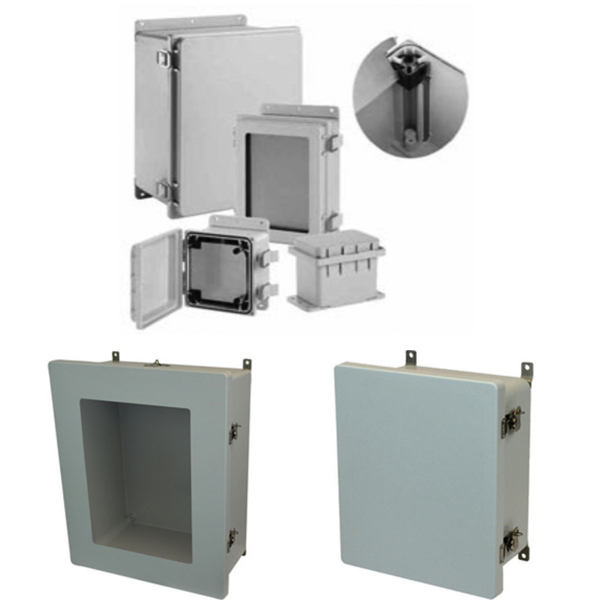Polyester Enclosures

Polyester enclosures are non-metallic electrical enclosures designed to protect electronic components, controls, and instrumentation from harsh environmental conditions. Manufactured from durable synthetic polymer materials, these enclosures offer excellent resistance to moisture, dust, corrosion, and chemical exposure. RSP Supply carries a full line of polyester enclosures from trusted manufacturers such as Hoffman and Vynckier, available in a wide range of sizes and NEMA 4, 4X, 12, and 13 ratings.
Lightweight yet strong, polyester enclosures are well suited for both indoor and outdoor industrial applications. Their corrosion-resistant construction makes them ideal for environments where metal enclosures may degrade, including wastewater treatment facilities, food and beverage processing, chemical plants, and outdoor installations. Many polyester enclosures are designed to meet specific NEMA or IP ratings, ensuring reliable protection against dust ingress, water spray, washdown, and other environmental hazards. Fiberglass reinforced polyester (FRP) enclosures provide additional strength and rigidity by incorporating fiberglass into the polyester resin. This composite construction improves impact resistance, vibration tolerance, and temperature stability, making FRP enclosures a preferred choice for demanding applications such as marine environments, corrosive industrial settings, and areas subject to mechanical stress. Polyester enclosures can also be customized with cutouts, mounting options, and accessories to support specific application requirements.
FAQs
Q: Are polyester enclosures suitable for outdoor use?
Yes, polyester enclosures are commonly used outdoors due to their resistance to corrosion, moisture, UV exposure, and environmental contaminants.
Q: Are polyester enclosures halogen-free?
Standard polyester enclosures are not inherently halogen-free, but some manufacturers offer alternative non-metallic enclosures made from halogen-free materials such as polycarbonate or ABS.
Q: Are polyester enclosures self-extinguishing?
Polyester enclosures are typically not self-extinguishing unless modified with flame-retardant additives. Fire performance varies by material and manufacturer specifications.
Q: What is fiberglass reinforced polyester (FRP)?
Fiberglass reinforced polyester is a composite material made by combining polyester resin with fiberglass, increasing strength, rigidity, impact resistance, and durability.
Q: How do polyester enclosures compare to plastic enclosures?
Polyester enclosures generally offer higher strength and environmental resistance than standard plastic enclosures, making them better suited for harsh industrial environments.
Why Buy Polyester Enclosures from RSP Supply
RSP Supply offers a comprehensive selection of polyester and fiberglass reinforced polyester enclosures from trusted manufacturers including Allied Moulded, Hoffman, Phoenix Contact, Rittal, and Schneider Electric. Our enclosure solutions provide reliable environmental protection, corrosion resistance, and compliance with NEMA standards for demanding industrial applications.

